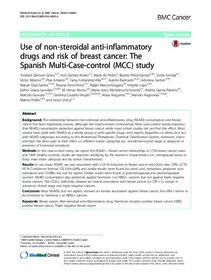Welcome to the UPF Digital Repository
Use of non-steroidal anti-inflammatory drugs and risk of breast cancer: The Spanish Multi-Case-control (MCC) study
JavaScript is disabled for your browser. Some features of this site may not work without it.
| dc.contributor.author | Dierssen Sotos, Trinidad |
| dc.contributor.author | Servitja Tormo, Sonia |
| dc.contributor.author | Gracia Lavedan, Esther |
| dc.contributor.author | Castaño Vinyals, Gemma |
| dc.contributor.author | Kogevinas, Manolis |
| dc.contributor.author | Llorca, Javier |
| dc.date.accessioned | 2016-11-16T12:35:31Z |
| dc.date.available | 2016-11-16T12:35:31Z |
| dc.date.issued | 2016 |
| dc.identifier.citation | Dierssen Sotos T, Gómez-Acebo I, de Pedro M, Pérez-Gómez B, Servitja Tormo S, Moreno V, et al. Use of non-steroidal anti-inflammatory drugs and risk of breast cancer: The Spanish Multi-Case-control (MCC) study. BMC Cancer. 2016; 16:660. DOI: 10.1186/s12885-016-2692-4 |
| dc.identifier.issn | 1471-2407 |
| dc.identifier.uri | http://hdl.handle.net/10230/27524 |
| dc.description.abstract | Background: The relationship between non-steroidal anti-inflammatory drug (NSAID) consumption and breast cancer has been repeatedly studied, although the results remain controversial. Most case-control studies reported that NSAID consumption protected against breast cancer, while most cohort studies did not find this effect. Most studies have dealt with NSAIDs as a whole group or with specific drugs, such aspirin, ibuprofen, or others, but not with NSAID subgroups according to the Anatomical Therapeutic Chemical Classification System; moreover, scarce attention has been paid to their effect on different tumor categories (i.e.: ductal/non-ductal, stage at diagnosis or presence of hormonal receptors). Methods: In this case-control study, we report the NSAID – breast cancer relationship in 1736 breast cancer cases and 1895 healthy controls; results are reported stratifying by the women’s characteristics (i.e.: menopausal status or body mass index category) and by tumor characteristics. Results: In our study, NSAID use was associated with a 24 % reduction in breast cancer risk (Odds ratio [OR] = 0.76; 95 % Confidence Interval [CI]: 0.64–0.89), and similar results were found for acetic acid derivatives, propionic acid derivatives and COXIBs, but not for aspirin. Similar results were found in postmenopausal and premenopausal women. NSAID consumption also protected against hormone + or HER2+ cancers, but not against triple negative breast cancers. The COX-2 selectivity showed an inverse association with breast cancer (i.e. OR < 1), except in advanced clinical stage and triple negative cancers. Conclusion: Most NSAIDs, but not aspirin, showed an inverse association against breast cancer; this effect seems to be restricted to hormone + or HER2+ cancers. |
| dc.description.sponsorship | The study was partially funded by the “Accion Transversal del Cancer” approved by the Spanish Council of Ministers on the 11th October 2007, by the Instituto de Salud Carlos III-FEDER (PI08/1770, PI08/0533, PI08/1359, PI09/00773-Cantabria, PI09/01286-León, PI09/01903-Valencia, PI09/02078-Huelva, PI09/01662-Granada, PI11/01403, PI11/01889-FEDER, PI11/00226, PI11/01810, PI11/02213, PI12/00488, PI12/00265, PI12/01270, PI12/00715, PI12/00150, PI14/01219, PI15/00069), by the Fundación Marqués de Valdecilla (API 10/09), by the ICGC International Cancer Genome Consortium CLL (The ICGC CLL-Genome Project is funded by Spanish Ministerio de Economía y Competitividad (MINECO) through the Instituto de Salud Carlos III (ISCIII) and Red Temática de Investigación del Cáncer (RTICC) del ISCIII (RD12/0036/0036)), by the Junta de Castilla y León (LE22A10-2), by the Consejería de Salud of the Junta de Andalucía (2009-S0143), by the Conselleria de Sanitat of the Generalitat Valenciana (AP_061/10), by the Recercaixa (2010ACUP 00310), by the Regional Government of the Basque Country, by the European Commission grants FOOD-CT-2006-036224-HIWATE, by the Spanish Association Against Cancer (AECC) Scientific Foundation and by the Catalan Government DURSI grant 2009SGR1489. |
| dc.format.mimetype | application/pdf |
| dc.language.iso | eng |
| dc.publisher | BioMed Central |
| dc.relation.ispartof | BMC Cancer. 2016;16:660 |
| dc.rights | © 2016 The Author(s). Open Access. This article is distributed under the terms of the Creative Commons Attribution 4.0 International License (http://creativecommons.org/licenses/by/4.0/), which permits unrestricted use, distribution, and reproduction in any medium, provided you give appropriate credit to the original author(s) and the source, provide a link to the Creative Commons license, and indicate if changes were made. |
| dc.rights.uri | http://creativecommons.org/licenses/by/4.0/ |
| dc.title | Use of non-steroidal anti-inflammatory drugs and risk of breast cancer: The Spanish Multi-Case-control (MCC) study |
| dc.type | info:eu-repo/semantics/article |
| dc.identifier.doi | http://dx.doi.org/10.1186/s12885-016-2692-4 |
| dc.subject.keyword | Breast cancer |
| dc.subject.keyword | Non-steroidal anti-inflammatory drug |
| dc.subject.keyword | Hormone receptor positive breast cancer |
| dc.subject.keyword | HER2 positive breast cancer |
| dc.subject.keyword | Triple negative breast cancer |
| dc.relation.projectID | info:eu-repo/grantAgreement/EC/FP7/036224 |
| dc.rights.accessRights | info:eu-repo/semantics/openAccess |
| dc.type.version | info:eu-repo/semantics/publishedVersion |


